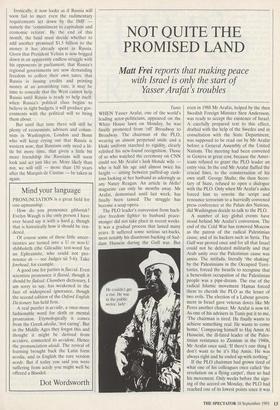Mind your language
PRONUNCIATION is a great field for one-upmanship.
How do you pronounce gibberish? Evelyn Waugh is the only person I have ever heard say it with a hard g, though that is historically how it should be ren- dered.
Of course some of these little uncer- tainties are turned into a U or non-U shibboleth (the Gileadite test-word for an Ephraimite, who could not pro- nounce sh — see Judges xii 5-6). Take forehead, for example.
A good one for parties is flaccid. Even scientists pronounce it Hassid, though it should be flaksid. Chambers dictionary, I am sorry to say, has weakened in the face of widespread ignorance, though the second edition of the Oxford English Dictionary has held firm.
A real puzzler is accidie, a once-more fashionable word for sloth or mental prostration. Etymologically it comes from the Greek acedia, 'not caring'. But in the Middle Ages they forgot this and thought it might be derived from accidere, connected to accident. Hence the pronunciation aksidi. The revival of learning brought back the Latin form acedia, and in English the rare version acedy. But if today you said you were suffering from acedy you might well be offered a Bisodol.
Dot Wordsworth


































































 Previous page
Previous page